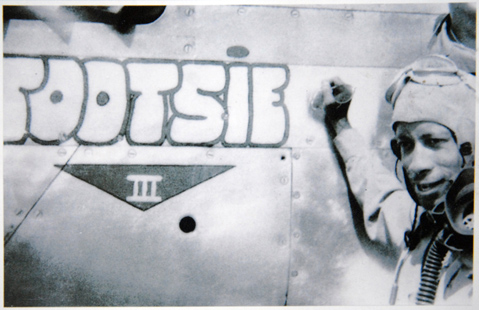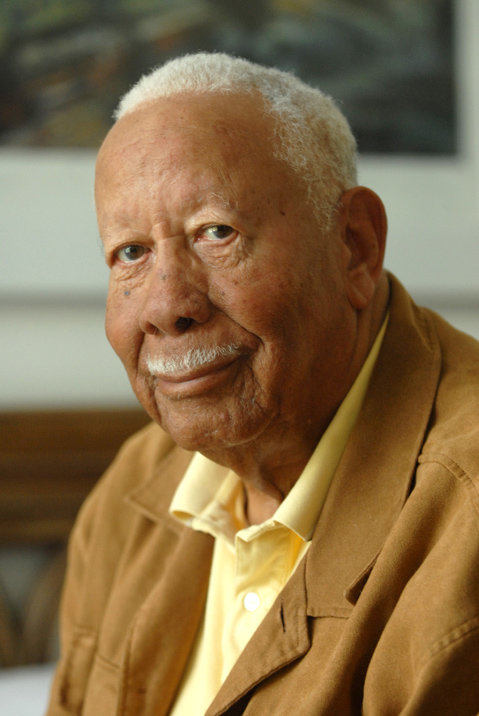From UCSB Basketball to Tuskegee Airman
Remembering Gaucho Lowell Steward, a Fearless Athlete and air force Pilot

When it was time to die, Lowell Steward went peacefully and fearlessly, “like the brave hero he is,” his son, Lowell Jr., said. That bravery stemmed from the only time Steward was helpless in the face of adversity, when he was a standout player for UCSB (then known as Santa Barbara State College) during the 1940-41 basketball season.
“We had six guys who could really play,” Steward told me 30 years ago during a reunion of the team. “Most of us were rejects from big colleges because of our size. We played fast … no-look passes, behind-the-back passes, through-the-leg passes, and full-court press.”
Steward was a nimble 5’11” athlete who played center because of his jumping ability. He was a high-jump champion at Jefferson High in Los Angeles and won a conference title for the Gauchos by clearing 6’4”. Utilizing quick moves to the hoop, he was the basketball team’s leading scorer and rebounder.

At the conclusion of a successful regular season, the Gauchos were invited to compete in the National Association of Intercollegiate Basketball (NAIB) tournament, the nation’s oldest and reputedly the toughest collegiate tournament because it brought 32 teams together for a week of nonstop games in Kansas City.
Santa Barbara had it tougher than the other 31 teams. Missouri was a segregated state, and the NAIB would allow only white players onto the court. The Gauchos had an African-American: Lowell Steward. Coach Willie Wilton sought his permission for the team to play without him. “They deserved a chance to play for the national championship,” Steward said.
Steward made the trip with his teammates, but he was barred from their hotel and from sitting with them on the bench. He stayed at a YMCA and was sent to the “colored” spectator section in the rafters of the Kansas City Auditorium. He watched the Gauchos win three straight games to reach the final four, but they lost to Kentucky’s Murray State in the semifinals, 35-33.
“I suffered many years from that experience,” Steward said. “People say if I played, we’d have won. That makes me feel good, like I was worth something. But I have no way of proving I was any good. It’s like a fantasy.”
Steward faced rejection again after the attack on Pearl Harbor. He and his teammates went to sign up for the army at the Santa Barbara recruiting office. All the others were accepted, but Steward was told to wait. That enabled him to stay on as captain of the depleted 1941-42 Gaucho basketball team. He graduated with a degree in physical education. “I had straight As in science and mathematics,” he said, “but nobody counseled me into becoming a scientist until I was a senior, and by then it was too late.”
Determined to prove he could handle difficult tasks, Steward found his opportunity in the war. He enlisted in the Army Air Corps and was sent to a training base for aspiring black aviators at the Tuskegee Institute in Alabama. “They said black boys didn’t have the intelligence to fly airplanes,” Steward said. “I joined the air force so I could explode the myth.”
When the Tuskegee Airmen got their chance to fly combat missions, they excelled, especially as escorts on bombing raids. “We trained so long, we were the best pilots they had,” said Steward, who completed 143 missions. “We were athletes. The only thing that keeps you from flying is fear. Athletes are known to be fearless, willing to try something on the edge. We were taught acrobatics, rolls and loops. We were the last of the seat-of-the-pants pilots.”
Steward practiced discipline in the air. “White pilots were trying to see how many planes they could shoot down,” he said. “I never shot anybody down. Our mission was to protect the bombers. We stayed in sight of them all the time.”
Hal Wilder was a B-24 bomber pilot who flew a terrifying mission over Germany in 1945. Nearing the target, his plane encountered a barrage of exploding flak. “I was scared to death,” Wilder said. “I was seriously considering bailing out.” Then he noticed a red-tailed P-51 fighter about 40 feet beyond his wing tip. It was a surprise because both escorts and enemy fighters normally avoided the flak zone. “He was a faceless pilot with an oxygen mask,” Wilder said of his unexpected attendant. “He was doing slow rolls. He was playing games! ‘Okay,’ I thought, ‘if you can do it, I can do it.’ He got me settled down to do my job.”
Wilder, 96, told this story during a dinner at the California Veterans Home in Ventura. Steward, who lived in Oxnard, was in attendance. “Major Steward was grinning and pointing to himself,” Wilder wrote in a recent memoir. “He was that nut. … The Red Tails had been based far north of our field. We had no contact with them on the ground. I had no hope of ever learning who it was who saved my honor that day. But what a coincidence! To find it was my friend, Lowell.”
Steward died at a Ventura hospital last Wednesday, December 17, after a short illness. He was 95. He lived 10 years longer than his wife, Helen, who was a Santa Barbara High student when they began dating. He made a living after the war as a realtor, finding decent homes for African-American families in Los Angeles. In addition to his son, he is survived by two daughters, seven grandchildren, and 13 great-grandchildren. Lowell Jr., who had a career in aerospace, said they will all be college graduates. He explained, “My father planted a seed of proficiency that perpetuates itself in further generations.”
Such is the legacy of a true patriot and patriarch.
GAUCHO GRID COACH DIES: Andy Everest, UCSB’s head football coach during its two seasons as a Division I program, died Sunday, December 21, at his home in Arlington, Texas. He was 90. Everest was “Cactus” Jack Curtice’s top assistant at UCSB for five years. After Curtice retired, Everest led the Gauchos in 1970 and 1971, when they tried to compete against the likes of Washington and Tennessee. They went 3-8 in the last season, after which UCSB dropped the program. Everest continued his career elsewhere as an assistant, including five seasons as tight-ends coach of the New Orleans Saints. He and his wife, Bonnie, celebrated their 70th wedding anniversary earlier this year. “He was a sweet man who touched the lives of many student-athletes,” said former UCSB tight end John Keever.



